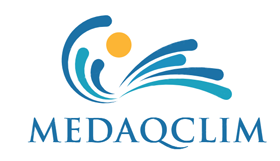Methodology
MEDAQCLIM PROJECT METHODOLOGY
The main objective of this project is to make a leap forward the quantitative assessment of long-term CC impacts on coastal water resources under CC uncertainty. Furthermore, the project aiming at probing the relationships among the future constraints imposed by CC with socioeconomic vulnerability and sustainable development. The proposed holistic assessment is achieved by using projections generated by CC and hydrological impact assessment models to subsequently identify vulnerability hotspots. The six targeted case studies considered in this project are selected from France, Italy, Greece, Morocco, Algeria, and Tunisia. This project involves cooperation and partnership between EC (France, Italy, and Greece) and Mediterranean Maghreb countries (Morocco, Algeria, and Tunisia). Hence, it has all attributes of an interregional partnership. This collaborative research involves research teams belonging to academic institutes, applied organizations, SMEs, and socio-economic stakeholders, such as the water basin agencies and the National Meteorological Centre of Morocco. Their main objective is to adapt science and technology currently available in the meteorological, hydrological, hydrogeological, and oceanography sciences, to enable improved water resources management and environmental protection. These R&D works also formalize the relationship between science and policymaking and fosters investigations across multiple disciplines and research areas. It is important to involve this myriad of scientific disciplines to be able in providing integrated answers that fully unlocks scientific and technological issues based on which depends water resources management success. The project also involves multidisciplinary teams to undertake the overall project work packages. Such partnership gathers required skills that contribute to maintain a high-level international scientific knowledge on the topic of water management in coastal areas. It also helps accelerating technological transfer from North to South to reduce the existing gaps between both sides. The results, organized under a Model-GIS platform, will be published, and disseminated, first between partners, and later on around the Mediterranean region and abroad.
This proposal is intended to develop an integrated and multidisciplinary approach in the Mediterranean coastal areas generating integrated models for optimal water management, artificial recharge, and aquifer exploitation under seawater intrusion constraints. Such approach which is capable to improve water resources management, control seawater intrusion into coastal aquifers, minimize pollution for efficient water use and reuse and intermediate the availability and need of water. It will also offer assessment of the socioeconomic vulnerability in the coastal areas presented in integrated maps that identify hotspots areas for informing policy dialogue and decision-making on CC adaptation. In order to meet the aforementioned demands the project propose an integrated approach where various mathematical models, techniques and approaches such as: climate change models and derived scenarios, unbiasing and downscaling processes for the climatic variables at regional scale, 3-dimensional Regional Sea Circulation Modeling, multiscale modelling of seawater intrusion in heterogeneous aquifers, modelling of seawater intrusion under climate change uncertainty, assessment of impact of Mediterranean sea level rise on salt- fresh- water interface dynamics, seawater management modelling under climate change uncertainty, integrated modelling of surface-subsurface and water-plant-soil-atmosphere interactions under climate change, investigation of agricultural drought assessment and indicators, modelling of coupled surface-subsurface processes to soil-plant-atmosphere interactions, implementation of coupled hydrological and regional sea circulation models, creation of databases including GIS and socioeconomic scenarios, and socioeconomic vulnerability assessment.

